
How To Make Mushroom Spawn Without A Pressure Cooker
If you're new to magic mushroom cultivation, then buying a pressure cooker might be a step too far for something you've never tried before. Fortunately, there are alternative methods that avoid this piece of kit. Learn two ways to create mushroom grain spawn without a pressure cooker.
Cultivating magic mushrooms at home can seem daunting if you’ve never done it before. Requiring lab-level cleanliness and consisting of numerous stages, it can be off-putting for some people. One of the main pieces of kit that mushroom growers often use is a pressure cooker, which makes sterilisation much easier.
Still, though it is useful, it is possible to sterilise substrates and grow magic mushrooms without one. In this article, we look at two methods to prepare grain spawn without using a pressure cooker.
Can you sterilise mushroom spawn without a pressure cooker?
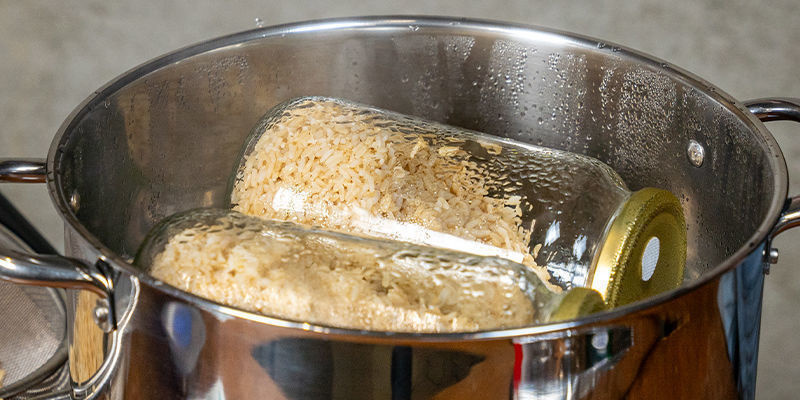
Yes, you can, but the process is different, and it limits what you can do. Potentially the most popular way to grow magic mushrooms at home—the PF Tek—is not possible if you don’t use a pressure cooker. But there are various other methods that can work.
These methods can use a variety of initial substrates, but all serve to create a “grain spawn” that can be used to colonise grain/seeds, which can then be transferred into a bulk grow.
Grain to bulk
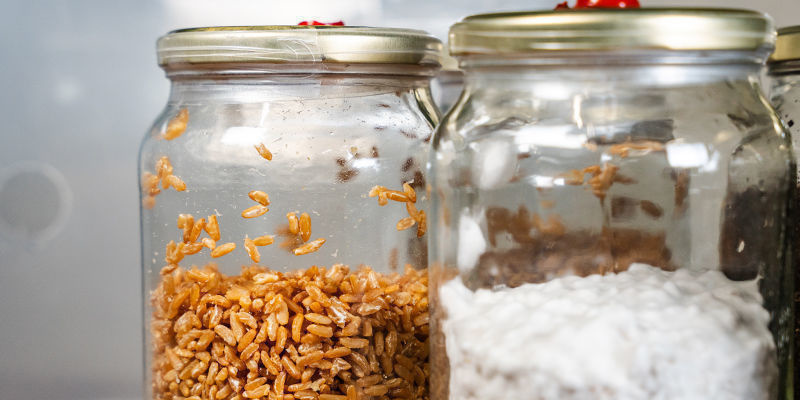
One of the easiest ways to grow very large quantities of magic mushrooms at home is to colonise grain with psilocybin mycelium and then transfer this to a bulk grow. You can inoculate the grain directly, but this can be time-consuming and increases the risk of contamination. So a potentially better method is to colonise a smaller substrate, and then go on to colonise the grain using that.
Arguably the best way to prepare grain is to sterilise it using a pressure cooker. However, if that’s not possible, it can be pasteurised (boiled) or steamed. But first, it should be soaked for 12–24 hours to activate any endospores already living in the grain, which can then be killed.
To pasteurise grain, it should be cooked in water at 62–82ºC for around two hours. This should kill off any competitive fungi trying to make a home there.
Also bear in mind that this doesn’t sterilise the jars, so these will also need to be submerged in boiling water for around ten minutes.
How to prepare a mushroom spawn without a pressure cooker
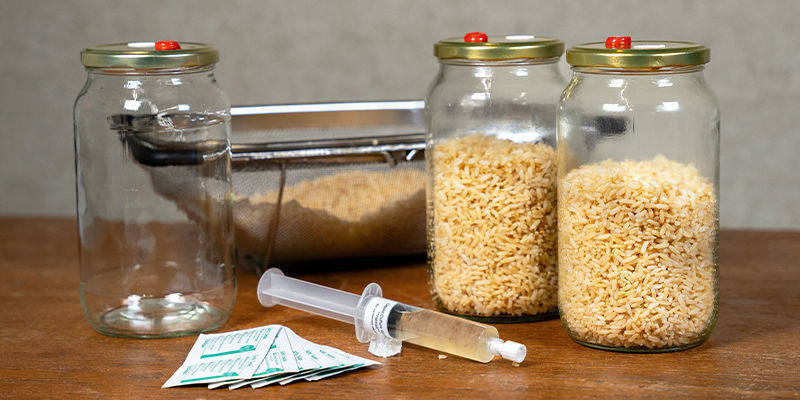
Now, without any further ado, let’s look at how to prepare mushroom spawn without using a pressure cooker. Below, we’ll cover two popular and easy techniques.
Broke Boi Tek
As its name suggests, this tek is cheap and easy. If you’re looking for a budget-friendly option that requires as little equipment and effort as possible, this is probably the one (although the next option may be even easier).
The Broke Boi Tek utilises brown rice, as it naturally has a very low endospore count, which means the chances of contamination are lower than with other substrate mixes. It’s also designed to be used as a grain spawn for a bulk grow.
Equipment
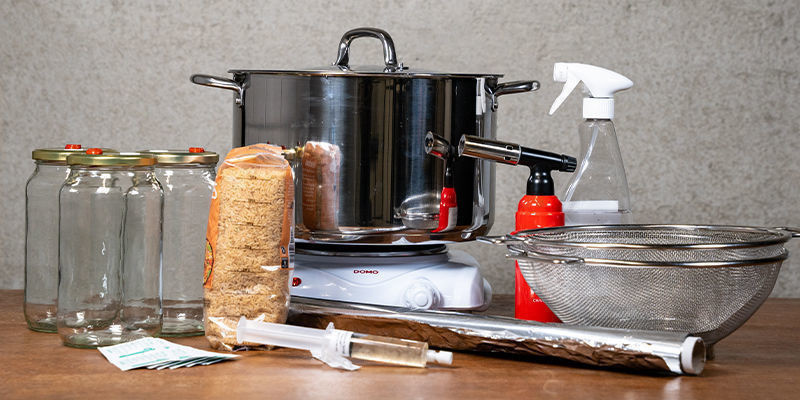
- Jar(s)
- Uncooked brown rice
- Large pot
- Aluminium foil
- Spore syringe
- Still air box
- Flame
- Micropore tape/self-healing injection port/silicone (optional)
- Vermiculite (optional)
- Disinfectant
Instructions
1. Prepare the rice: First, you need to prepare the rice. The key here is to fully rehydrate it but not actually cook it. Generally, the packaging says to cook brown rice for around 15 minutes, ao simmering it for 10 should suffice. Once it’s rehydrated, rinse it off with cold water to cool it and remove the starch so it doesn't clump.

2. Make inoculation ports (optional): If you want to, you can punch holes in the lids of your jars so that you can inoculate through them. This saves you from needing to open up the jar and expose it to contaminants. To do so, make a hole in the lid of a jar using a drill or a knife, then cover the hole with micropore tape, a self-healing injection port, or a lump of silicone.

3. Prepare the jars: Now, fill the jars ¾ of the way with rice. You could also mix in around 10% vermiculite if you have it, but this isn’t necessary. If you do, though, it will help to prevent the rice from clumping. You must not fill the jars more than ¾, as there needs to be space for later. Close the lids, but loosen them by ¼ to ½ of a turn. Cover loosely with aluminium foil; this should come down below the lid.

4. Sterilise: Place your jars in a cooking pot, but support them so they are lifted off the bottom. Shot glasses work well for this. Then, fill the pot around halfway with water. Heat it until the water boils, then turn it down to a simmer. Place a lid on and leave it for around 90 minutes.

5. Inoculate: Once everything has cooled, wash your hands/wear surgical gloves. Wipe down surfaces with disinfectant. Then, remove the jars and place them beneath a still air box. Hold the needle of your syringe in a flame until it is red-hot. Now, if you created an injection port, you can inject around 5ml of spore solution through it. If you didn’t, crack open the lid quickly and squirt some solution in, then close it immediately. Leave it opened about a half-turn for air exchange, and place the foil loosely back over the top.

6. Let the mycelium form: Now, leave the jars somewhere dry to begin colonising. An ambient temperature of between 23–28ºC is best. After around a week or two (or when about 25% of the substrate is colonised), shake up the contents of the jar. This breaking up and moving around of the rice will help to spread the mycelium and speed up colonisation. Mycelium is tough; this process won’t damage it.

7. Let it colonise: Leave it for another week or so, and it should be fully colonised. Now it can be used as a grain spawn.

Uncle Ben’s Tek
Another easy method that doesn’t use a pressure cooker is Uncle Ben’s Tek. This uses precooked rice bags as the initial substrate. These are already sterilised and make for an incredibly simple method.
Despite the name, you can use any precooked rice bags. However, it must only contain plain, brown rice. Anything else will contain the wrong balance of nutrients for Psilocybe mycelium. Some people report that Uncle Ben’s can sometimes contain too much moisture, which can aid contamination, and thus suggest some other options. Figuring out which is best will require a little experimentation, or a browse among the internet’s many forums dedicated to mushroom cultivation.
Equipment
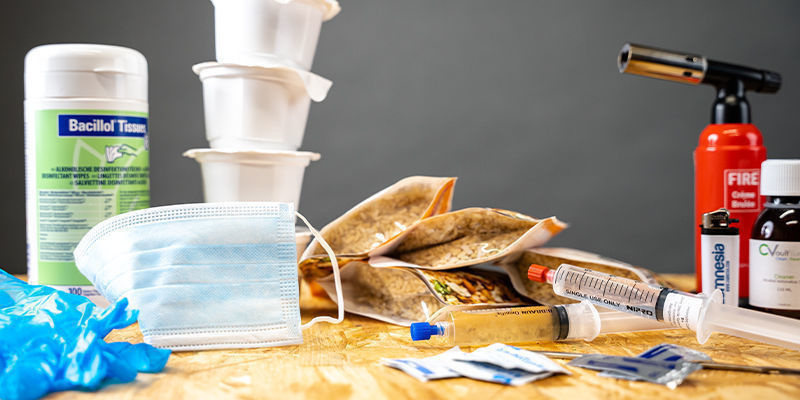
- Precooked brown rice
- Spore syringe
- Scissors/scalpel
- Disinfectant
- Surgical gloves
- Flame
- Still air box (optional)
- Micropore tape
Instructions
1. Sterilise equipment and environment: Wipe down surfaces, including the outside of the rice bags. Then, heat the needle of the syringe in a flame until it is red-hot. Also, clean the scissors/scalpel using disinfectant.
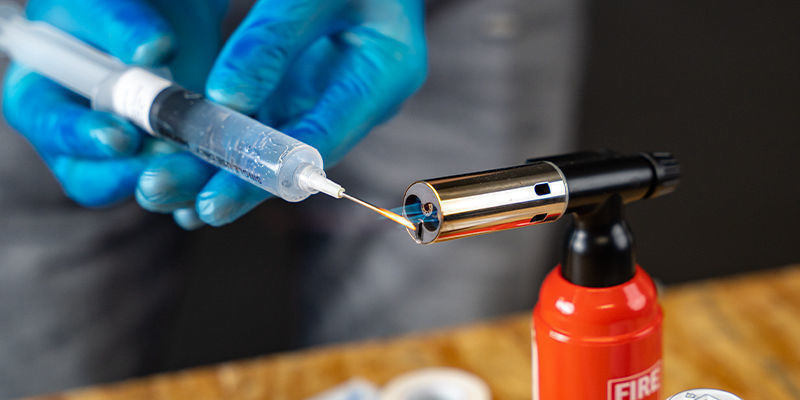
2. Allow for air exchange: Cut a corner of each bag of rice and cover with micropore tape. Don’t seal the cut, but leave it open beneath the tape, as this will allow for air exchange.
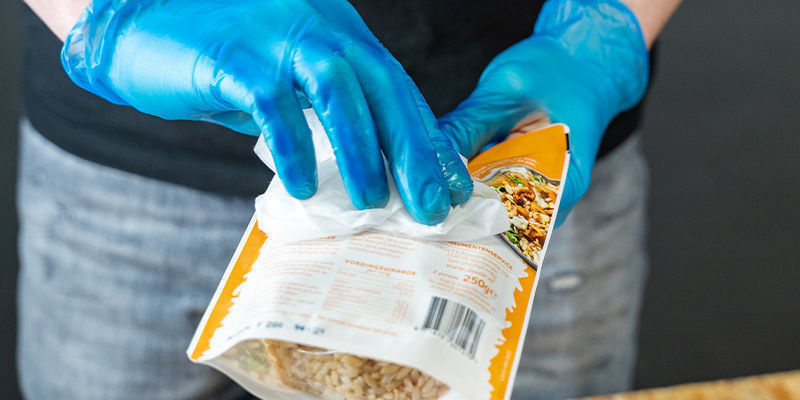
3. Inoculate: Inject 5ml of spore solution through the centre of the rice bag. Immediately cover with micropore tape.
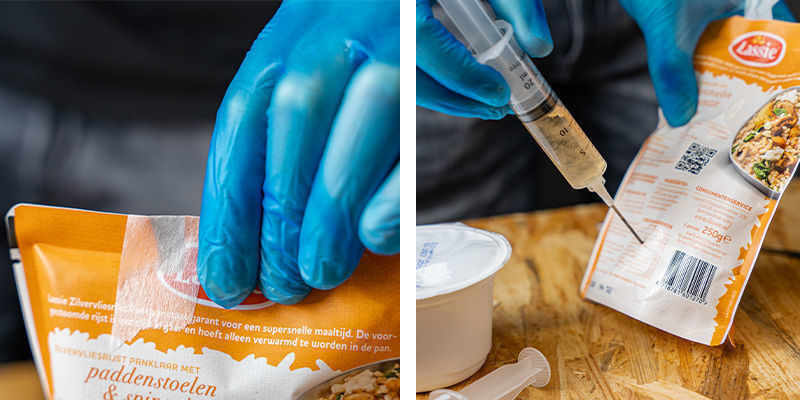
4. Let the mycelium grow: Place the bags in a dry environment with a temperature of 23–28ºC. Once around 25% of the bag is colonised, shake it and break up the contents, redistributing the mycelium inside so that it colonises faster. Many rice bags have a transparent bottom through which you can gauge the speed of colonisation. If your bag doesn’t have this, then shake it up after 10–14 days of inoculation.
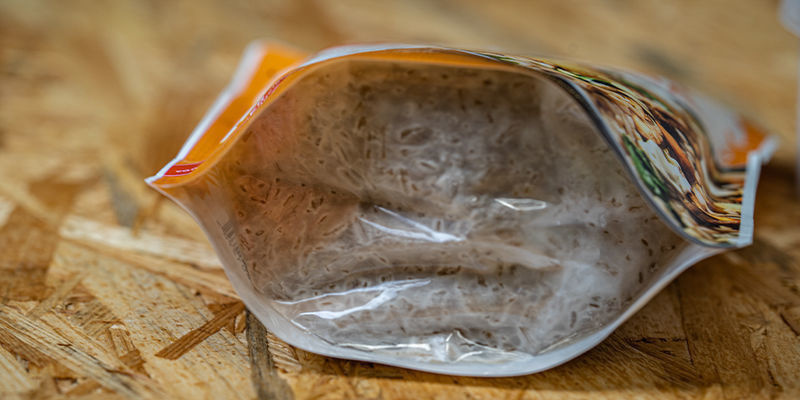
5. Leave the bags to finish colonising: The bags should now take a further week or two to completely colonise. After this, they can be opened and used as grain spawn.
What are the risks of sterilising without a pressure cooker?
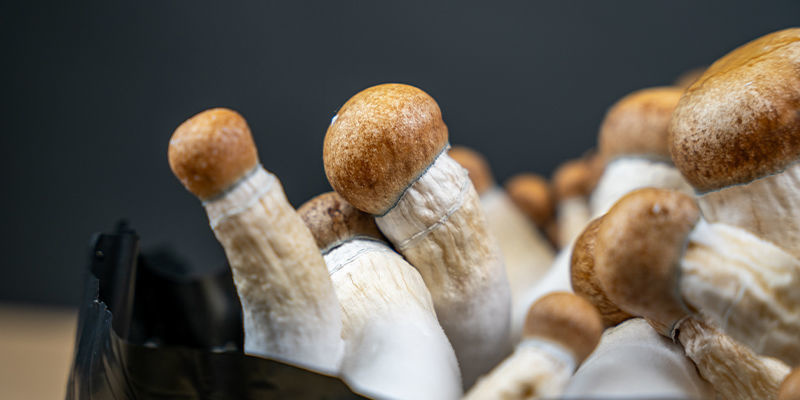
Sterilising without a pressure cooker isn’t as effective as doing so with one. The Broke Boi Tek is easy, but it is known to come with a greater risk of contamination compared to, say, a well-executed PF Tek.
Using precooked rice bags is fairly safe as they come already sterilised, and so the risk of contamination is very low.
Still, with either technique, the grain you go on to inoculate won’t be as sterile as if you had used a pressure cooker.
Moving on to bulk substrate sterilisation
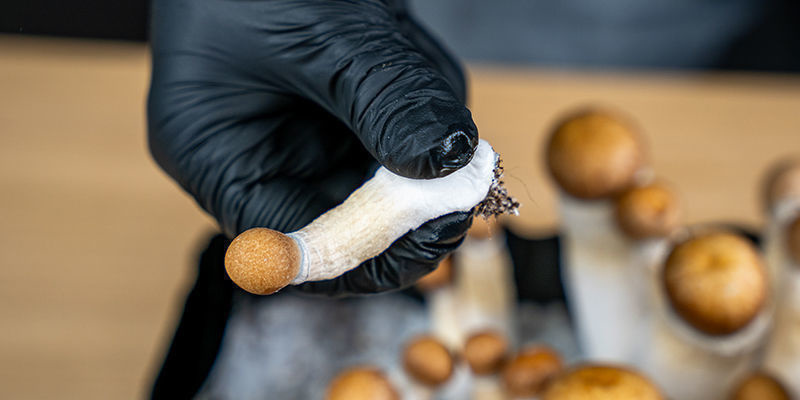
There are many ways to make a bulk substrate. Whichever you go for, if you intend to continue not using a pressure cooker, ensure that it can be pasteurised or steamed. Then, you can add your fully colonised grain to it and prepare for a major harvest of magic mushrooms!
Most methods of magic mushroom cultivation use a pressure cooker, and these are generally considered to be the most reliable and productive methods. But if you want to grow shrooms without one, it is still possible, and good results are well within your reach. Good luck!
-
 5 min
23 August 2024
Fungal Flowers: Can Mushrooms Revolutionise The World Of...
Mushrooms and flowering plants belong to two entirely different kingdoms of life. However, species from each are undeniable beautiful. Humans have grown and displayed flowers in their dwellings for...
5 min
23 August 2024
Fungal Flowers: Can Mushrooms Revolutionise The World Of...
Mushrooms and flowering plants belong to two entirely different kingdoms of life. However, species from each are undeniable beautiful. Humans have grown and displayed flowers in their dwellings for...
-
 5 min
29 July 2024
How To Store Magic Mushrooms
If you want your shrooms to stand the test of time, then you'll need to not only dry them properly, but store them adequately too. While not difficult, it is important to get this right if you want...
5 min
29 July 2024
How To Store Magic Mushrooms
If you want your shrooms to stand the test of time, then you'll need to not only dry them properly, but store them adequately too. While not difficult, it is important to get this right if you want...
-
 4 min
23 September 2014
Creating A Magic Mushroom Outdoor Patch
Mushrooms are usually cultivated indoors, but that’s not how it has to be. With some mycelium you can easily grow a years’ supply of the sacrament in your backyard.
4 min
23 September 2014
Creating A Magic Mushroom Outdoor Patch
Mushrooms are usually cultivated indoors, but that’s not how it has to be. With some mycelium you can easily grow a years’ supply of the sacrament in your backyard.









 United States
United States













